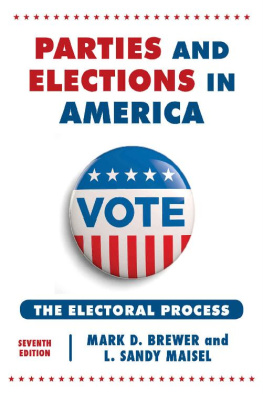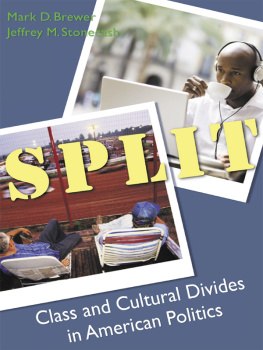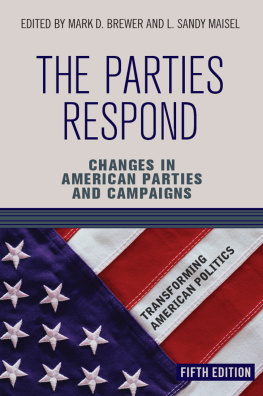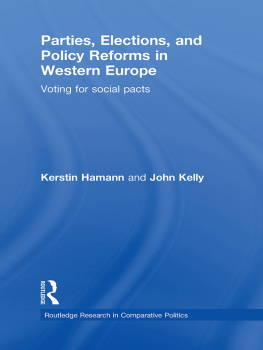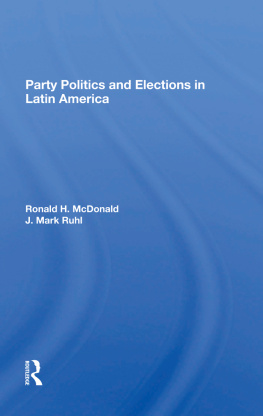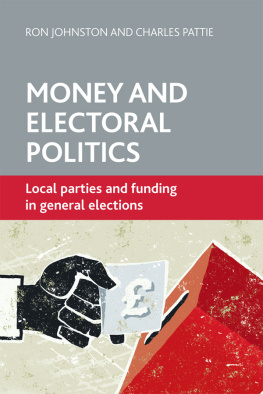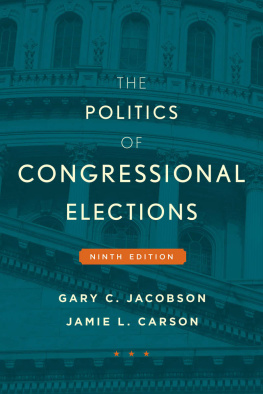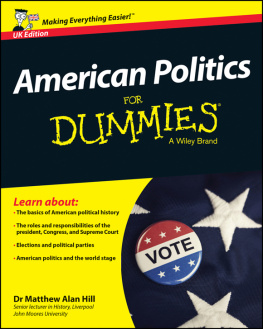Mark D. Brewer - Parties and Elections in America: The Electoral Process
Here you can read online Mark D. Brewer - Parties and Elections in America: The Electoral Process full text of the book (entire story) in english for free. Download pdf and epub, get meaning, cover and reviews about this ebook. year: 2015, publisher: Rowman & Littlefield, genre: Science / Politics. Description of the work, (preface) as well as reviews are available. Best literature library LitArk.com created for fans of good reading and offers a wide selection of genres:
Romance novel
Science fiction
Adventure
Detective
Science
History
Home and family
Prose
Art
Politics
Computer
Non-fiction
Religion
Business
Children
Humor
Choose a favorite category and find really read worthwhile books. Enjoy immersion in the world of imagination, feel the emotions of the characters or learn something new for yourself, make an fascinating discovery.
- Book:Parties and Elections in America: The Electoral Process
- Author:
- Publisher:Rowman & Littlefield
- Genre:
- Year:2015
- Rating:3 / 5
- Favourites:Add to favourites
- Your mark:
- 60
- 1
- 2
- 3
- 4
- 5
Parties and Elections in America: The Electoral Process: summary, description and annotation
We offer to read an annotation, description, summary or preface (depends on what the author of the book "Parties and Elections in America: The Electoral Process" wrote himself). If you haven't found the necessary information about the book — write in the comments, we will try to find it.
Parties and Elections in America: The Electoral Process — read online for free the complete book (whole text) full work
Below is the text of the book, divided by pages. System saving the place of the last page read, allows you to conveniently read the book "Parties and Elections in America: The Electoral Process" online for free, without having to search again every time where you left off. Put a bookmark, and you can go to the page where you finished reading at any time.
Font size:
Interval:
Bookmark:
Parties and Elections in America
Parties and Elections in America
The Electoral Process
Seventh Edition
Mark D. Brewer
University of Maine
L. Sandy Maisel
Colby College
ROWMAN & LITTLEFIELD
Lanham Boulder New York London
Executive Editor: Traci Crowell
Associate Editor: Molly White
Senior Marketing Manager: Karin Cholak
Marketing Manager: Deborah Hudson
Cover Designer: Dustin Watson
Credits and acknowledgments borrowed from other sources and reproduced, with permission, in this textbook appear on appropriate page within the text or in the credit section on pages 433.
Published by Rowman & Littlefield
A wholly owned subsidiary of The Rowman & Littlefield Publishing Group, Inc.
4501 Forbes Boulevard, Suite 200, Lanham, Maryland 20706
www.rowman.com
Unit A, Whitacre Mews, 26-34 Stannary Street, London SE11 4AB
Copyright 2016 by Rowman & Littlefield
All rights reserved . No part of this book may be reproduced in any form or by any electronic or mechanical means, including information storage and retrieval systems, without written permission from the publisher, except by a reviewer who may quote passages in a review.
British Library Cataloguing in Publication Information Available
Library of Congress Cataloging-in-Publication Data
Brewer, Mark D.
Parties and elections in America : the electoral process / Mark D. Brewer, L. Sandy Maisel. Seventh edition.
pages cm
Revised edition of: Parties and elections in America : the electoral process / L. Sandy Maisel and Mark D. Brewer. 6th ed., c2012.
Includes bibliographical references and index.
ISBN 978-1-4422-4984-4 (cloth : alk. paper) ISBN 978-1-4422-4973-8 (pbk. : alk. paper) ISBN 978-1-4422-4974-5 (electronic) 1. ElectionsUnited States. 2. Political campaignsUnited States. 3. Political partiesUnited States. I. Maisel, Louis Sandy, 1945 II. Title.
JK1965.M35 2016
324.973dc23
2015027164
 The paper used in this publication meets the minimum requirements of American National Standard for Information SciencesPermanence of Paper for Printed Library Materials, ANSI/NISO Z39.48-1992.
The paper used in this publication meets the minimum requirements of American National Standard for Information SciencesPermanence of Paper for Printed Library Materials, ANSI/NISO Z39.48-1992.
Printed in the United States of America
Contents
FIGURES
Two-Party Competition in Twentieth and Twenty-first-Century Presidential Elections
Two-Party Competition in the Twentieth and Twenty-first Century Senate
Two-Party Competition in the Twentieth and Twenty-first Century House of Representatives
Party Division Prior to Realignment on Slavery Issue
Stress on Party System Caused by Slavery Issue
Party System after Realignment on Slavery
Turnout in Presidential and Midterm Elections, 19482014
Voter Turnout by Race, 19642012
Voter Turnout by Age, 19642012
Voter Turnout by Gender, 19642012
Funnel of Causality
Electoral Success of Incumbent Representatives, 19802014
Electoral Success of Incumbent Senators, 19802014
Electoral Success of Incumbent Governors, 19802014
Turnout in Iowa Caucuses, 19682012
Nonparty Independent Expenditures in Congressional Elections, 19782014
General Election Spending by Major Party Presidential Candidates, 19522012
Mean House Campaign Expenditure, by Party, 1974, 1984, 19902012
Mean House Campaign Expenditure, by Candidate Status, 1974, 1984, 19902012
Mean Senate Campaign Expenditure, by Party, 1974, 1984, 19902012
Mean Senate Campaign Expenditure, by Candidate Status, 1974, 1984, 19902012
PAC Contributions to Congressional Elections, 19742014, in millions of dollars
PAC Contributions to Congressional Candidates by Candidate Status, 2014
Structure of a Modern Campaign
Party Unity Votes in Congress, 19542013
Party Unity Scores in the House, 19542013
Party Unity Scores in the Senate, 19542013
TABLES
Elections Held in Baton Rouge, Louisiana, 20102015
Term-Limited States
Black Voter Registration in Southern States, 19602012
Registered Voters and Percentage of Voter Turnout, 19882012
How V.O. Key Would Have Characterized Voters after the 2012 Election (major party supporters only)
Party Identification, 19522012
Types of Organizations and Examples of Associations
Growth of Political Action Committees, 19742014
Top Ten PACs in Contributions to Federal Candidates, 20132014
Funding Sources for Congressional Candidates, 1974, 1984, 19942012
PAC Contributions to Congressional Candidates by Party, 19982014
Top Ten Outside Groups in Federal Campaign Spending, 2014 Election Cycle
Electoral Context of Gubernatorial Elections
Offices at the Top of the Ballot
Third Parties on the 2012 Congressional, Gubernatorial, or Presidential Ballot in at Least One State
Number of Presidential Primaries and the Percentage of Delegates Selected in Them, 19682012
Money Raised by Major Party Candidates for Presidential Nominations, 2012
Sitting Senators Seeking Their Partys Presidential Nomination, 19682012
Americans Primary Source of News About Government and Politics, MarchApril 2014
Party Leadership in the House, April 2015
Party Leadership in the Senate, April 2015
Mark D. Brewer is Professor of Political Science and member of the Honors College faculty at the University of Maine. His research interests focus generally on political behavior, with specific research areas including partisanship and electoral behavior at both the mass and elite levels, the linkages between public opinion and public policy, and the interactions that exist between religion and politics in the United States. Brewer is the author or editor of a number of books and articles in academic journals, with the most recent being Polarization and the Politics of Personal Responsibility (with Jeffrey M. Stonecash, Oxford University Press, 2015), The Parties Respond , 5th edition (with L. Sandy Maisel, Westview Press, 2013), Party Images in the American Electorate (Routledge, 2009), and Dynamics of American Political Parties (with Jeffrey M. Stonecash, Cambridge University Press, 2009). He is also the editor-in-chief of the New England Journal of Political Science .
L. Sandy Maisel is the William R. Kenan, Jr. Professor and chair of the Department of Government at Colby College. A former (unsuccessful) candidate for Congress, Maisel is the author or editor of more than twenty books focusing on American political parties and elections. His articles, many of which emerged out of the path-breaking Candidate Emergence Study, have appeared in the American Political Science Review , the American Journal of Political Science , the Journal of Politics , and other political science journals and anthologies of research on American elections.
The 2008 presidential election was one of the most compelling races in American history. The 2010 midterm elections produced the largest seat gain for one party in the House of Representatives since 1948. The partisan winners in each cycle were of course dramatically different. The 2012 presidential contest saw incumbent President Barack Obama win a second term rather easily, while in 2014 Republicans expanded their control of the U.S. House of Representatives and took control of the Senate from the Democrats. Again, a dramatic difference in partisan outcomes. What are we to make of this?
The 2008 presidential election was an intense and gripping affair, and Obamas victory in combination with the Democrats increasing their majorities in both houses of Congress led many to proclaim the start of a new Democratic era in American electoral politics. The Republican party was in dire straits, and the triumphant Democrats had the chance to enact some major changes in American politics. The Democrats did indeed deliver major policy shifts. They did not, however, reap any political benefit from their accomplishments, at least not in the short term. Energized by anti-incumbent and anti-Obama sentimentmanifested most prominently in the Tea Party movementRepublicans dramatically regained control of the House of Representatives, and significantly closed the gap in the Senate. The 2010 midterm elections were perhaps the most intense midterm contests in recent memory, and the Republicans worked this to their advantage. Obama revised his powerful campaign machine in 2012 and fought off a challenge from the solid but ultimately uninspiring Mitt Romney. But by 2014 Obama was deeply unpopular, and the Republicans took advantage, cleaning up not only at the congressional level but at the state level as well. Clearly we live in exciting political times where either party can win or lose elections. Fortunately, our current political situation also represents a fruitful learning experience.
Next pageFont size:
Interval:
Bookmark:
Similar books «Parties and Elections in America: The Electoral Process»
Look at similar books to Parties and Elections in America: The Electoral Process. We have selected literature similar in name and meaning in the hope of providing readers with more options to find new, interesting, not yet read works.
Discussion, reviews of the book Parties and Elections in America: The Electoral Process and just readers' own opinions. Leave your comments, write what you think about the work, its meaning or the main characters. Specify what exactly you liked and what you didn't like, and why you think so.

